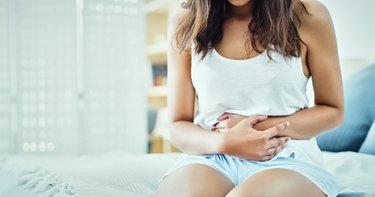
At first it sounds implausible, but popping an over-the-counter antihistamine may help relieve some of the symptoms of irritable bowel syndrome (IBS), including stomach pain and bloating, according to a growing body of evidence.
As many as 45 million people in the U.S. live with IBS, and it affects twice as many women as men, according to the International Foundation for Gastrointestinal Disorders. IBS is a functional bowel disorder, which means that it causes problems with how your stomach and bowels work, but it turns out that the problems can have far-reaching effects.
Video of the Day
Video of the Day
"Damage to the gut that occurs with IBS will often travel with sensitivity to histamines, and we know that histamines exist in larger quantities in people with IBS, resulting in inflammation that may worsen IBS symptoms," explains William J. Bulsiewicz, MD, a gastroenterologist in Mount Pleasant, S.C., and author of the forthcoming book Fiber Fueled.
As the U.S. National Library of Medicine (NLM) explains, antihistamines traditionally treat allergies and some cold symptoms by blocking the effects of histamine, which your body releases, along with other chemicals, when you have an allergic reaction. Antihistamines treat sniffling, sneezing and teary eyes.
The Antihistamine-IBS Connection
When histamine is released in the gut, nerve receptors called TRPV1 are activated, according to an April 2016 study in Gastroenterology. "Histamine triggers the nerves and the TRPV1 tells us that something is wrong by causing abdominal pain," explains Dr. Bulsiewicz.
What's more, the study's researchers found that blocking histamine prevents the chain reaction with TRPV1 and relieves pain. Specifically, people with IBS who took an antihistamine called ebastine for 12 weeks had significantly less abdominal pain than their counterparts who did not take this hay fever medication.
This drug is not available in the U.S. There are, however, many over-the-counter antihistamines available here that work in a similar fashion. These include Benadryl (diphenhydramine), Claritin (loratadine) and Zyrtec (cetirizine). "Some people with IBD may find a benefit from using an antihistamine because it is helping to block the pain signal," Dr. Bulsiewicz says.
One thing to consider: All drugs have side effects, and antihistamines are no exception. Some antihistamines may cause dry mouth, drowsiness, excitability, vision changes or decreased appetite, according to the NLM.
Other Ways to Treat IBS Symptoms
"Antihistamines are just a patch," Dr. Bulsiewicz says. "They are not fixing the problem in IBS." The only way to truly stop IBS symptoms is to restore balance between good and bad bacteria in the gut. This starts with slowly adding more fiber to your diet. Fiber is a prebiotic, which means it feeds the good bacteria in the gut, helping to restore this balance, he says.
Adults should aim for 22 to 34 grams of fiber a day, according to the 2015-2020 Dietary Guidelines for Americans. The National Institute of Diabetes and Digestive and Kidney Diseases suggests increasing fiber by just 2 to 3 grams a day to prevent gas and bloating and choosing foods with more soluble than insoluble fiber, such as beans, fruit and oats. Consuming too much fiber too fast can backfire, causing gas and possibly triggering IBS symptoms.
Also aim to drink eight glass of water a day — staying well hydrated also helps your body move fiber more efficiently through your system.
Some people may also benefit from a low-FODMAP diet, Dr. Bulsiewicz explains. FODMAP stands for fermentable oligosaccharides, disaccharides, monosaccharides and polyols. These are specific strands of carbohydrates that feed the bad microbes in your gut.
Foods that contain loads of FODMAPs are fruits such as apples, vegetables such as artichokes, asparagus, beans and cabbage, dairy products, foods with high-fructose corn syrup and wheat- and rye-based foods.
Ask your doctor if this type of diet is worth trying for your symptoms. He or she may suggest a trial that starts with avoiding foods that are high in FODMAPs and then slowly adding them back one by one to determine which, if any, trigger your symptoms.
- International Foundation for Gastrointestinal Disorders: “Facts About IBS”
- Gastroenterology: “Histamine Receptor H1–Mediated Sensitization of TRPV1 Mediates Visceral Hypersensitivity and Symptoms in Patients with Irritable Bowel Syndrome”
- U.S. National Library of Medicine: “Antihistamines for Allergies”
- U.S. Department of Health and Human Services: “The 2015-2020 Dietary Guidelines for Americans”
- National Institute of Diabetes and Digestive and Kidney Diseases: “IBS, Eating, Diet and Nutrition”
Is this an emergency? If you are experiencing serious medical symptoms, please see the National Library of Medicine’s list of signs you need emergency medical attention or call 911.